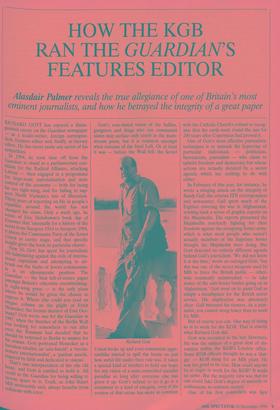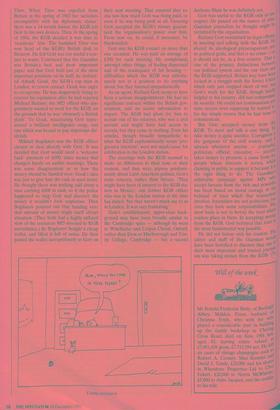HOW THE KGB
RAN THE GUARDIAN'S
FEATURES EDITOR
Alasdair Palmer reveals the true allegiance of one of Britain's most
eminent journalists, and how he betrayed the integrity of a great paper
RICHARD GOTT has enjoyed a distin- guished career on the Guardian newspaper as a leader-writer, foreign correspon- dent, features editor and, finally, as literary editor. He has never made any secret of his sYmpathies.
In 1964, he took time off from the Guardian to stand as a parliamentary can- didate for the Radical Alliance, attacking Labour — then engaged in a programme for large-scale nationalisation and state control of the economy — both for being far too right-wing, and for failing to sup- .,,,,port North Vietnam's war of liberation. 'nifty years of reporting on life in people's republics around the world has not Changed his views. Only a week ago, he wrote of Eric Hobsbawm's book Age of Extremes that 'unusually for a history of the World from Sarajevo 1914 to Sarajevo 1994, ,t Places the Communist Party of the Soviet Union at centre stage, and that specific insight gives the book its particular charm'. NOW 56, Gott has spent his journalistic 1-`e fulminating against the evils of interna- tional capitalism and attempting to air- brush out the faults of Soviet conununism. It is an idiosyncratic position. The Guardian — the best left-of-centre paper a, mongst Britain's otherwise overwhelming- 1Y right-wing press — is the only place Where he would be given the chance to express it. Where else could you read an elegiac column on the plight of Erich Honecker, the former dictator of East Ger- Many? Gott wrote one for the Guardian in 1991, when the Butcher of the Berlin Wall Was looking for somewhere to run after even the Russians had decided that he his be returned to Berlin to answer for nis crimes. Gott portrayed Honecker as a harmless idealist, an 'anti-fascist', a 'revolu- tionary internationalist', a 'puritan ascetic, inspired by faith and dedicated to visions'. That's one interpretation of the vile old 'Me, and Gott is entitled to hold it. All eredit to the Guardian for being willing to devote space to it. Truth, as John Stuart Mill memorably said, always benefits from collisions with error. Gott's rose-tinted vision of the bullies, gangsters and thugs who ran communist states may surface only rarely in the main- stream press, but it is common amongst what remains of the hard Left. Or at least it was — before the Wall fell. the Soviet Richard Gott Union broke up and even communist appa- ratchilcs started to spill the beans on just how awful life under their rule was. It takes a special kind of intellect to hold out hope for any vision of a state-controlled socialist paradise so long after everyone else has given it up. Gott's refusal to let it go is a testament to a kind of integrity, even if his version of that virtue has more in common with the Catholic Church's refusal to recog- nise that the earth went round the sun for 200 years after Copernicus had proved it.
One of Gott's most effective journalistic techniques is to unmask the hypocrisy of particular individuals — politicians, bureaucrats, journalists — who claim to uphold freedom and democracy but whose actions are actually dictated by a secret agenda which has nothing to do with either.
In February of this year, for instance, he wrote a stinging attack on the integrity of Sandy Gall, the veteran ITN correspondent and newscaster. Gall spent much of the Eighties covering the war in Afghanistan, sending back a series of graphic reports on the Mujahedin. The reports presented the Mujahedin resolutely fighting for their freedom against the occupying Soviet army, which is what most people who weren't actually members of the Supreme Soviet thought the Mujahedin were doing. But Gott detected an entirely different agenda behind Gall's journalism. 'We did not know it at the time,' wrote an outraged Gott, 'but this was one of the secret weapons used by MI6 to force the British public — other- wise cosmically uninterested — to take notice of the anti-Soviet battles going on in Afghanistan.' Gott went on to paint Gall as simply a mouthpiece for the British secret service. His implication was absolutely clear: Gall betrayed his viewers. As a jour- nalist, you cannot stoop lower than to work for MI6.
But of course you can. One way of doing so is to work for the KGB. That is exactly what Richard Gott did.
Gott was recruited in the late Seventies. He was the subject of a great deal of dis- cussion within the KGB's London office. Some KGB officers thought he was a 'dan- gle' — KGB slang for an MI6 plant. He was too good to be true. How could anyone be so eager to work for the KGB? It made no sense. But the majority view was that no one could fake Gott's degree of sincerity or enthusiasm, so contacts started.
One of his first controllers was Igor Titov. When Titov was expelled from Britain in the spring of 1983 for 'activities incompatible with his diplomatic status', there was a 14-month hiatus: the KGB left Gott to his own devices. Then, in the spring of 1984, the KGB decided it was time to 'reactivate' him. The banished Titov was now head of the KGB's British desk in Moscow. He felt Gott was too useful a con- tact to waste. Convinced that the Guardian was Britain's best and most important paper and that Gott held one of the most important positions on its staff, he instruct- ed Arkady Gouk, the KGB's top man in London, to renew contact. Gouk was eager to co-operate. He was desperately trying to recover his reputation after he had rejected Michael Bettany, the MI5 officer who also genuinely wanted to work for the KGB, on the grounds that he was 'obviously a British plant'. To Gouk, reactivating Gott repre- sented a brilliant intelligence coup, and one which was bound to pay important div- idends.
Mikhail Bogdanov was the KGB officer chosen to deal directly with Gott. It was decided that Gott would need a 'welcome back' payment of £600, since money had changed hands on earlier meetings. There was some disagreement as to how the money should be handed over. Gouk's idea was just to give him the cash in used notes. He thought there was nothing odd about a man carrying £600 in cash, so if the police happened to stop Gott and discover the money it wouldn't look suspicious. Then Bogdanov pointed out that handing over that amount of money might itself attract attention. (They both had a highly inflated view of the resources MIS devoted to KGB surveillance.) So Bogdanov bought a cheap wallet, and filled it full of notes. He then passed the wallet surreptitiously to Gott on
their next meeting. That ensured that no one saw how much Gott was being paid, or even if he was being paid at all. Ensuring Gott accepted the KGB's money guaran- teed the organisation's power over him. From now on, he could, if necessary, be blackmailed.
Gott met his KGB contact on more than one occasion. He was paid an average of £300 for each meeting. He complained, amongst other things, of feeling depressed and of the inadequacy of his housing — difficulties which the KGB was unfortu- nately not in a position to do anything about, but they listened sympathetically.
As an agent, Richard Gott seems to have been a serious disappointment. He had no significant contacts within the British gov- ernment, and no secret information to impart. The KGB had plans for him to recruit one of his relatives, who was a civil servant and might have had access to secrets, but they came to nothing. Even his articles, though broadly sympathetic to what the KGB euphemistically terms 'pro- gressive interests', were not much cause for celebration in the London station.
The meetings with the KGB seemed to make no difference to their tone or their content, and they were anyway predomi- nantly about Latin American politics, Gott's main concern, rather than Britain. 'They might have been of interest to the KGB sta- tion in Mexico,' one former KGB officer who was in the London station at the time has stated, 'but they weren't much use to us in London. It was very frustrating.'
Gott's establishment, upper-class back- ground may have been broadly similar to the Cambridge spies — although he went to Winchester and Corpus Christi, Oxford, rather than Eton or Marlborough and Trin- ity College, Cambridge — but a second Young executive. Anthony Blunt he was definitely not.
Gott was useful to the KGB only in Ole respect. He passed on the names of other Guardian journalists he thought might be recruited by the organisation. Richard Gott committed no legal offence in meeting and talking with the KGB. He, shared its ideological preoccupations all its political goals, and that is no crime — it should not be, in a free country. That is one of the primary distinctions between our political system and the one Gott and the KGB supported. Britain may have been locked in a struggle with the Soviet 'UM° which only just stopped short of war, but Gott's work for the KGB, though harcllY helpful to his country, did not compromise its security. He could not communicate anY state secrets even supposing he wanted to, for the simple reason that he had none te communicate. But Gott accepted money from the KGB. To meet and talk is one thing• take money is quite another. Corruption the gangrene of the civil society, and It spreads whenever anyone — journalist, politician, official, executive — secrettY takes money to promote a cause from ale people whose interests it serves, whilst. claiming in public to support it because it Is the right thing to do. The Guardian s admirable campaign against MPs WI° accept favours from the rich and power"' has been based on moral outrage at the betrayal of trust which that transaction involves. Journalists are not politicians, be even they have some responsibilities. T.Itt,e most basic is not to betray the trust Ole" readers place in them. In accepting Mone.„Y from the KGB, Gott betrayed that trust n' the most fundamental way possible. He did not betray only his readers.Tile, editor and staff of the Guardian rvotilu, have been horrified to discover that one 0` their most important and trusted journal' ists was taking money from the KGB. CT° gauge how horrified, you need only read the paper's articles on who paid for Jonathan Aitken's stay at the Ritz in Paris.) And they will be horrified when they find, out that's what happened, because - as write this piece - they still don't knoW There is no reason to believe that anyone on the paper - apart from Richard Gott - has the slightest inkling of what he did. The revelation of Gott's betrayal cannot conceivably be thought to involve any issue of national security. We are no longer in 3 state of Cold War with the Soviet Union an entity which no longer exists - and' anyway, the KGB has known about Gott from the start. So why not forgive and for- get? Because before you can forgive and forget, you first have to know. And knoW- ing is of critical interest, at least to anyone who reads Richard Gott.
The British secret services have knoWn about Gott's KGB retainer since the defec- tor Oleg Gordievslcy handed them a list of KGB contacts in Britain in 1985. There are names far more illustrious than Richard Gott's on that list, including several pronli- nent establishment figures. Our secret ser- vices have done everything possible to keel) those names secret. They continue to do so.
The Spectator's information has corn from former members of the KGB, 110t from serving or past members of our own security services. The reasons for MI5's and MI6's decision to protect the reputa- tion of people they know are guilty of acts of betrayal are mysterious. For even theY must recognise that publication of those names cannot breach national securitY; indeed, publication cannot affect nationa' security in any way whatever. So why have the security agencies taken it on themselves to deny the British public information erin" cal to a decision on whether these men some of whom hold public office - shoUlu be trusted? The KGB knows, the securitY services know. The only people who don't know are the people who most need to: the voters, including those who read the Guardian, not to mention its editor, the genuinely incorruptible Peter Preston. This is exactly the kind of issue which the neW parliamentary security oversight connilit- tee, created by the Security Services Act' must examine. The ability of the comMittee, of irteslveaalsueethose names will be the acid te
f si
In the meantime, Richard Gott - if he is not sacked by the Guardian - will contin; ue to write dottily idealistic pieces aNnai communism, and scathingly columns about American domination anis capitalist corruption. Even though there, a no evidence that he has accepted anythILeb" from the KGB for ten years, perhaPs "e might now think it better to spare us soetno of his high moral outrage at the corroPti° of the British Establishment.
Additional research in Moscow bY Applebaum. Atifie




































































 Previous page
Previous page